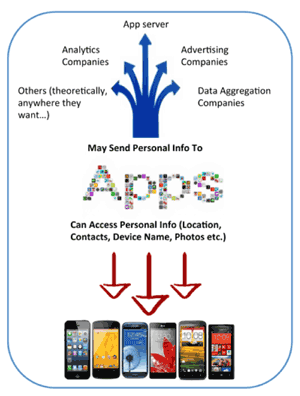One app in three access the location and two out of three follow your identity
<-.! .post -summary ->

The Android apps use the permissions that ask to access the personal information of users: a store online notes the location of a phone up to 10 times per minute, French researchers found. The tools to manage these accesses are limited and insufficient before how mobile phones can gather information.
In a recent study, 10 volunteers used Android devices that accompanied the behavior of applications using another application monitoring, the Mobilitics , developed by the French National Institute for Informatics Research (INRIA) in conjunction with the National Commission for Informatics and Freedom (CNIL). The Mobilitics recorded each time another app acceded to personal data – the phone’s location, an identifier, photos, messages and other – and were subsequently transmitted to an external server. Registration of use of personal information in the applications was stored in the device and transferred to the end of three months for analysis.
The volunteers were encouraged to use mobile phones as their own and, in total, were used 121 investments during the period from July to September. A similar study last year used a special app on iOS to examine the way iPhone applications accessing the personal data of users.
Many applications access the identifying characteristics of mobile phones to follow its users, say the researchers. One of the few options that users have to avoid this behavior is a switch in the “Google Settings” (“Google Settings”) to reset the identification (ID) advertising on your phone. That’s not much help, since applications have other ways to identify users. Almost two thirds of Apps analyzed in the three-month trial agreed at least once to a mobile phone identifier, a quarter of them, at least two identifiers, and a sixth to three or more. This allows apps have profiles of their users for advertising purposes

The location was one of the most frequently accessed data . Accounted for 30% of total access to personal information during the test, and 30% of apps analyzed did it at some point. The Facebook app location registration of a voluntary 150 000 times during the period of three months – more than once per minute on average, and Google Play Store another user recorded 10 times per minute in some cases. Often, the only use these apps make of such information is to serve personalized advertising, as was the case of a game that recorded the location of the user 3,000 times during the study. The volume of collected data is impressive:. An app, installed root in mobile phones, acceded to the user’s location a million times over a month
The apps do not need many permissions to build a comprehensive user profile, said researcher INRIA, Vincent Roca. He described how, simply requesting access permissions in “Internet” and “ACCESS_WIFI_STATE”, an application could identify the machine using the MAC address of your Wi-Fi adapter and record their movements. The app can even allow your programmer map the network of social contacts of the user, by sending information – about the time he found a Wi-Fi network in particular – to a central server, where the information can be compared with similar data from other mobile phones to see who else was at the same time at a certain place
The CNIL. – equivalent to the Portuguese National Data Protection Commission – want the app developers or mobile operating systems to take more responsibility for what can be done with their products, and to make continuous efforts to provide users more tools to manage their privacy. The president of the CNIL, Isabelle Falque-Pierrotin, said the “privacy by design” (“privacy by design”) should be the philosophy of programmers, and urged them to minimize the collection of data that is not needed for applications to meet its purpose.
No comments:
Post a Comment